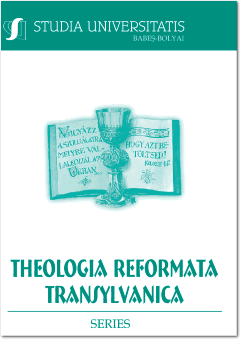ZWINGLIAN–CALVINIST DEBATE ON CHURCH DISCIPLINE IN THE PAYS DE VAUD
ZWINGLIAN–CALVINIST DEBATE ON CHURCH DISCIPLINE IN THE PAYS DE VAUD
Author(s): Gábor János LányiSubject(s): Christian Theology and Religion, Theology and Religion, Islam studies, Comparative Studies of Religion, Religion and science , Sociology of Religion, History of Religion
Published by: Studia Universitatis Babes-Bolyai
Keywords: Calvin; Calvinism; Zwinglianism; Pays de Vaud; Berne; Reformation debate; Wolfgang Musculus; Pierre Viret; church discipline; excommunication; church–state relations.
Summary/Abstract: The article discusses a theological debate on church discipline between Calvinist pastors living in the French speaking territory of Pays de Vaud and the Zwinglian City-state of Berne from the mid-1530s to 1560. From 1536 Pays de Vaud be-longed to the Bernese protestant administration but consisted primarily of French refugee pastors allegiant to Calvin and his ideas. They Calvinists of Pays de Vaud questioned the civil magistrate’s right to interfere into church affairs especially into the practice of church discipline, such as exclusion from the Lord’s Supper and excommunication from the congregation. According to the Zwinglian establishment of Berne the right for exclusion and excommunication belonged to the civil magistrates. In the Calvinists’ view the appropriate administrator of the exclusion and excommunication was the Genevian-type consistory, consisting of both clerical and civilian elected members.Noteworthy significance can be attributed to the events in the Pays de Vaud. On the one hand, banished from Bernese territory most of the Calvinist pastors of Vaud were sent to reinforce the French underground evangelical movement. The Calvinists’ failure in the Pays de Vaud turned Calvin’s attention to France by which the Calvinism became a world phenomenon. On the other hand, from this struggle emerged a theological justification for the state’s supremacy over church affairs, namely by Wolfgang Musculus’ De Magis-tratibus. Interestingly, this justification played a more important role in later times than in the actual controversy: Thomas Erastus, the builder of the territorial state–church of the Palatinate, John Withgift, the archbishop of Canterbury and the protector of Tudor-Absolutism against the Puritans, and the Dutch Remon-strants all were influenced by the teaching of Musculus. The goal of this paper is to present how the two controversial sides regulated its church affairs and, in addition, to show the highpoint of the debate between Calvin’s Vaudois adherers and the Bernese Magistrate for the government of the church, especially for the right of excommunication.
Journal: Studia Universitatis Babeș - Bolyai Theologia Reformata Transylvanica
- Issue Year: 62/2017
- Issue No: 2
- Page Range: 94-119
- Page Count: 26
- Language: English

